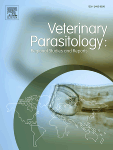Ver ítem
- xmlui.general.dspace_homeCentros e Institutos de InvestigaciónCICVyA. Centro de Investigación en Ciencias Veterinarias y AgronómicasInstituto de BiotecnologíaArtículos científicosxmlui.ArtifactBrowser.ItemViewer.trail
- Inicio
- Centros e Institutos de Investigación
- CICVyA. Centro de Investigación en Ciencias Veterinarias y Agronómicas
- Instituto de Biotecnología
- Artículos científicos
- Ver ítem
Use of molecular tools for the diagnosis of rangeliosis by Rangelia vitalii in Argentina: A case report
Resumen
Vector-borne pathogens are responsible for serious emerging diseases and Rangelia vitalii, the etiologic agent of canine rangeliosis, is one of the most pathogenic tick-borne pathogens for dogs in South America. This protozoan is transmitted by the Amblyomma aureolatum tick bite and the clinical features associated to the disease are fever, hemolytic anemia, jaundice, hepatosplenomegaly and bleeding from natural orifices, mainly from the ear egde. The
[ver mas...]
Vector-borne pathogens are responsible for serious emerging diseases and Rangelia vitalii, the etiologic agent of canine rangeliosis, is one of the most pathogenic tick-borne pathogens for dogs in South America. This protozoan is transmitted by the Amblyomma aureolatum tick bite and the clinical features associated to the disease are fever, hemolytic anemia, jaundice, hepatosplenomegaly and bleeding from natural orifices, mainly from the ear egde. The reports of canine rangeliosis in Argentina are scarce. In the present study we report the detection of Rangelia vitalii in a naturally infected dog from Gualeguay, Entre Ríos, Argentina with history of tick infestation and clinical signs compatible with rangeliosis. An initial blood sample was positive to piroplasmids by blood smear examination and the molecular amplification of a fragment of the 18SrRNA gene. Sequencing of the fragment confirmed the pathogen identity. After treatment with imidocarb dipropionate, the clinical signs remitted and the blood smear tested negative.
[Cerrar]

Autor
Borras, Pablo;
Salvador, F.;
Rinaldi, V.;
Armitano, Rita Inés;
Farber, Marisa Diana;
Sanchez, R.;
Mori, L.;
Guillemi, Eliana Carolina;
Fuente
Veterinary Parasitology: Regional Studies and Reports 21 : 100426 (July 2020)
Fecha
2020-07
Editorial
Elsevier
ISSN
2405-9390
Formato
pdf
Tipo de documento
artículo
Palabras Claves
Derechos de acceso
Abierto
 Excepto donde se diga explicitamente, este item se publica bajo la siguiente descripción: Creative Commons Attribution-NonCommercial-ShareAlike 2.5 Unported (CC BY-NC-SA 2.5)
Excepto donde se diga explicitamente, este item se publica bajo la siguiente descripción: Creative Commons Attribution-NonCommercial-ShareAlike 2.5 Unported (CC BY-NC-SA 2.5)


